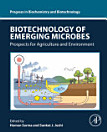Ethnic and Indigenous Food Technologies: Role in Climate and Health Resilience
About this ebook
This book explores the intersection of ethnic fermented foods, global ecological change, and evolving fermentation technologies. It examines how climate variability affects traditional food systems and emphasizes the need for preserving indigenous knowledge. The volume provides in-depth insights into the biochemistry, microbiology, biotechnology, and nutritional composition of a diverse range of ethnic and indigenous fermented foods.
With a focus on both traditional practices and contemporary scientific advancements, this book offers valuable perspectives on sustainable food systems, food security, and health resilience. It serves as a vital reference for researchers, academicians, and students in the fields of food science, biotechnology, microbiology, biochemistry, and environmental studies.
About the author
Dr. Ajita Tiwari holds a degree in Agricultural Engineering and completed her Master’s in Process and Food Engineering. She earned her Ph.D. from the Indian Agricultural Research Institute (IARI), New Delhi. Since 2006, she has been serving as an Assistant Professor and is currently the Head of the Department of Agricultural Engineering at Assam University, Silchar. With over 15 years of teaching and research experience, Dr. Tiwari’s expertise lies in the development of value-added products from agricultural waste, formulation and quality analysis of food products, bioproduct production, and fermentation kinetics. She has authored over 30 research papers in reputed peer-reviewed international journals and contributed to more than 15 book chapters, conference proceedings, and has several patents to her credit. She has delivered more than 50 invited lectures at national and international conferences, seminars, and workshops. Dr. Tiwari is also the Principal Investigator of multiple externally funded research projects supported by agencies such as AICTE, ASTEC, and DST.
Dr. Hemen Sarma earned his Ph.D. in Botany from Gauhati University in 2008, followed by postdoctoral research at North East Hill University, Shillong, and the Institute of Advanced Studies in Science and Technology (IASST), Guwahati. He is currently serving as an Associate Professor at Bodoland University and was elected a Fellow of The Linnean Society of London in 2022. Dr. Sarma’s research focuses on plant–microbe interactions, microbial biotechnology, nanobiotechnology, and environmental sustainability. With over 15 years in academia, he has authored more than 80 publications in peer-reviewed international journals, including conference papers, book chapters, and patents. He has also edited eight books published by leading international publishers. His work has been recognized with several prestigious fellowships and awards, including the DBT Overseas Associateship, DBT-Research Associateship, IISc Research Associateship, and the UGC–Dr. D.S. Kothari Postdoctoral Fellowship. He has successfully completed a research project funded by the Department of Biotechnology, Government of India.






